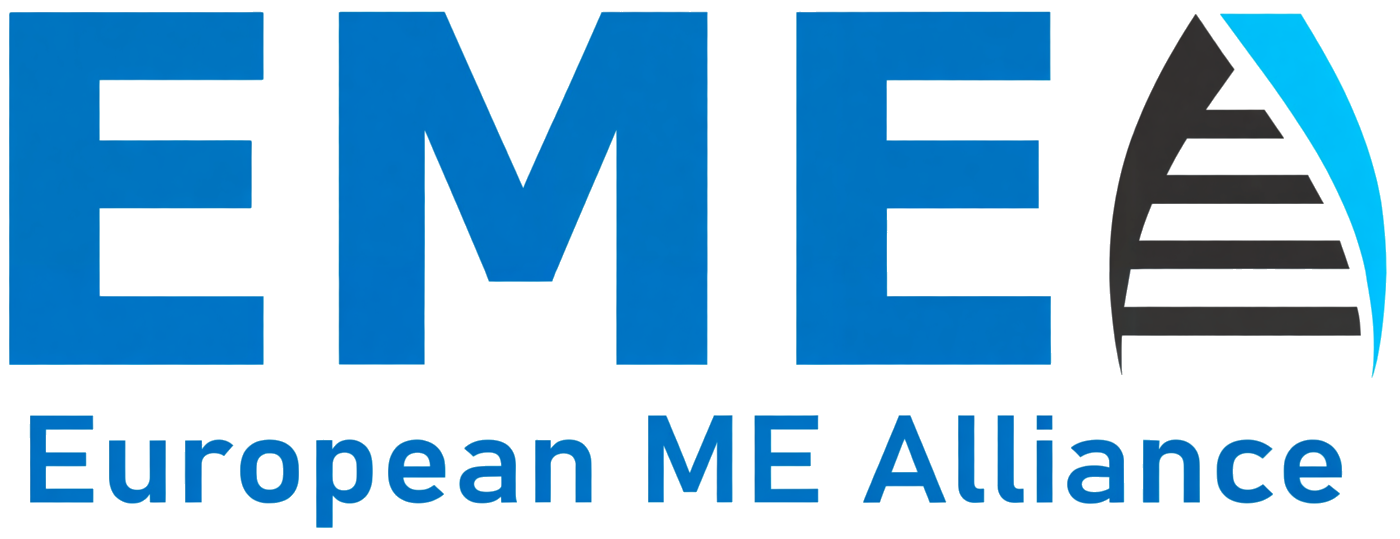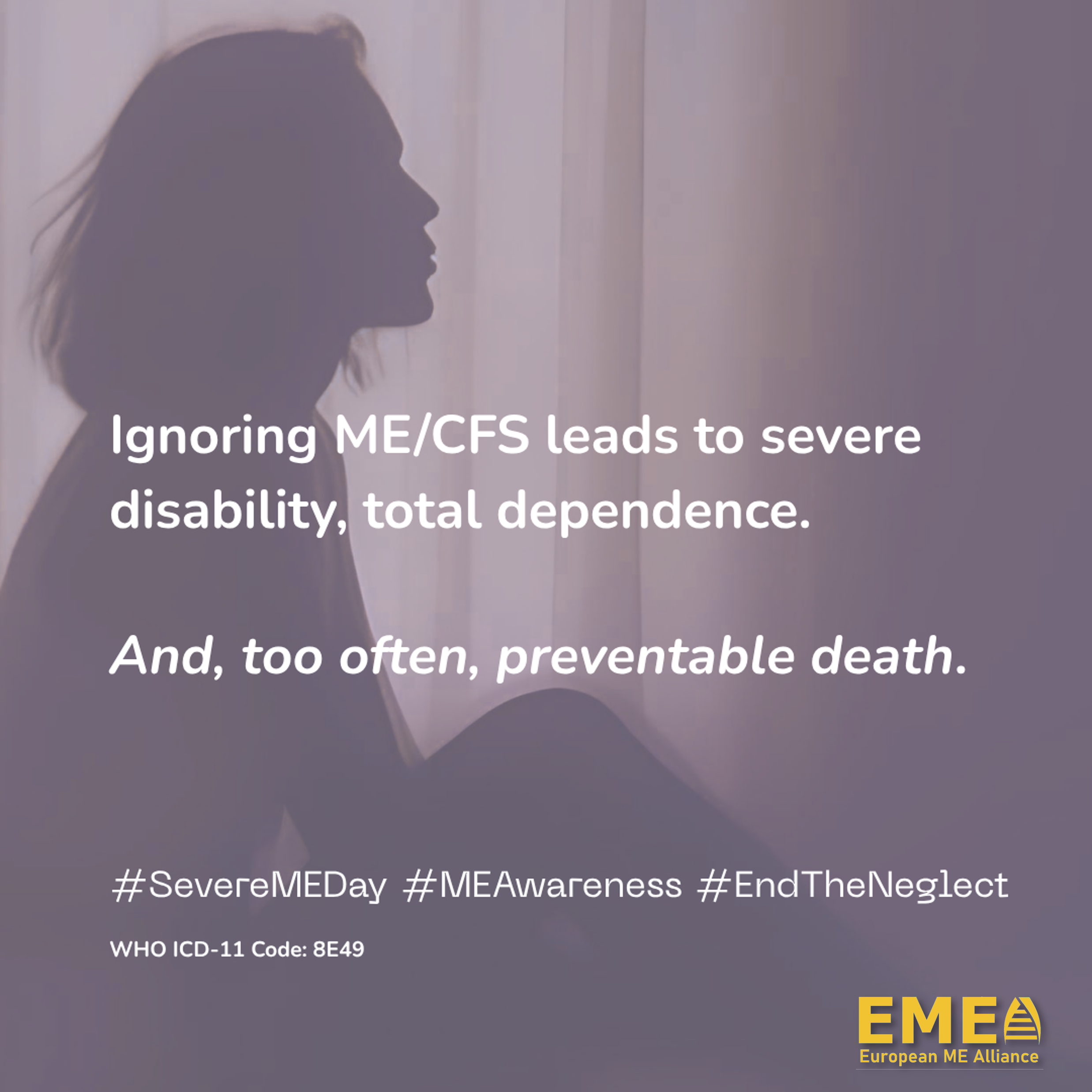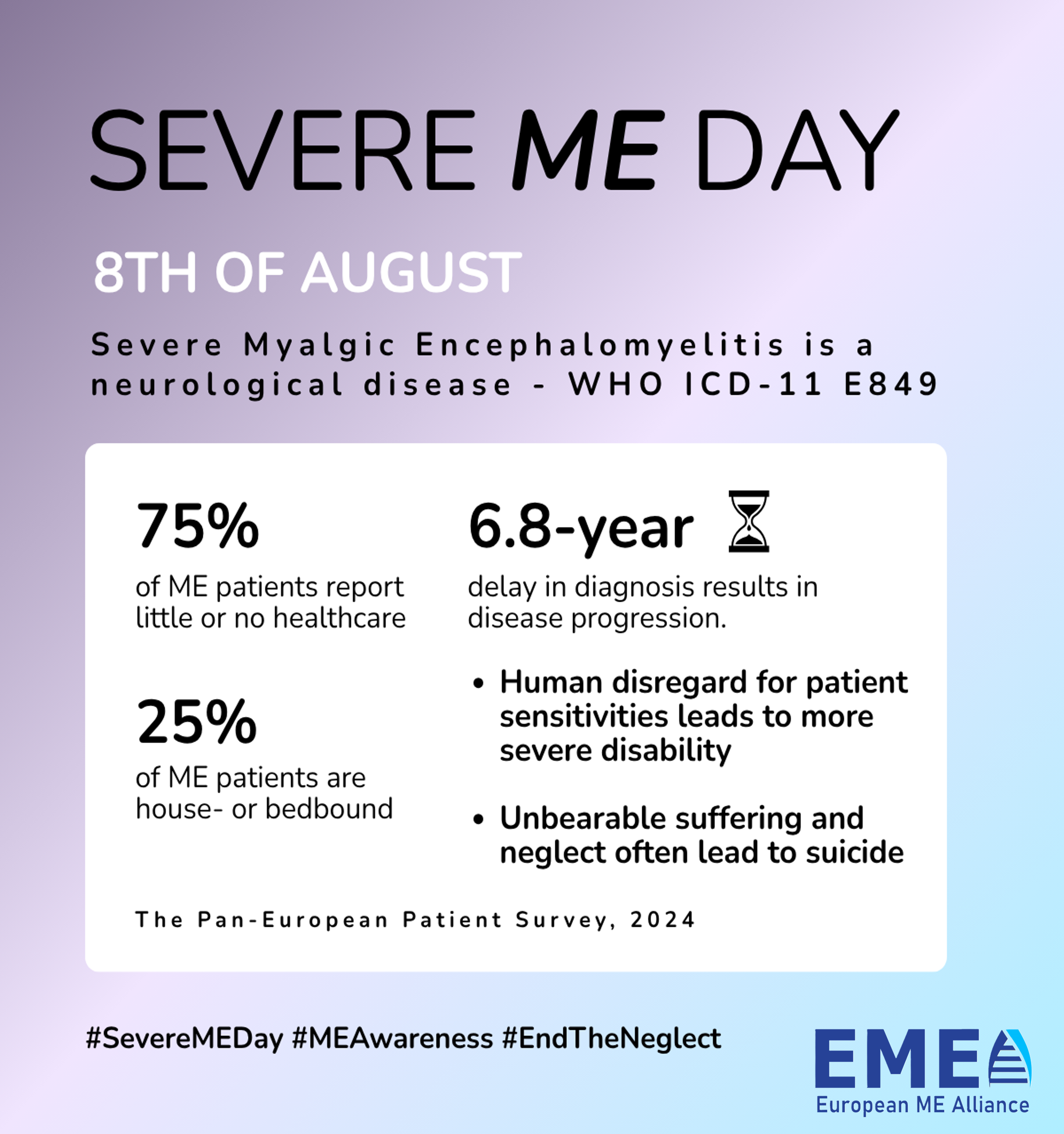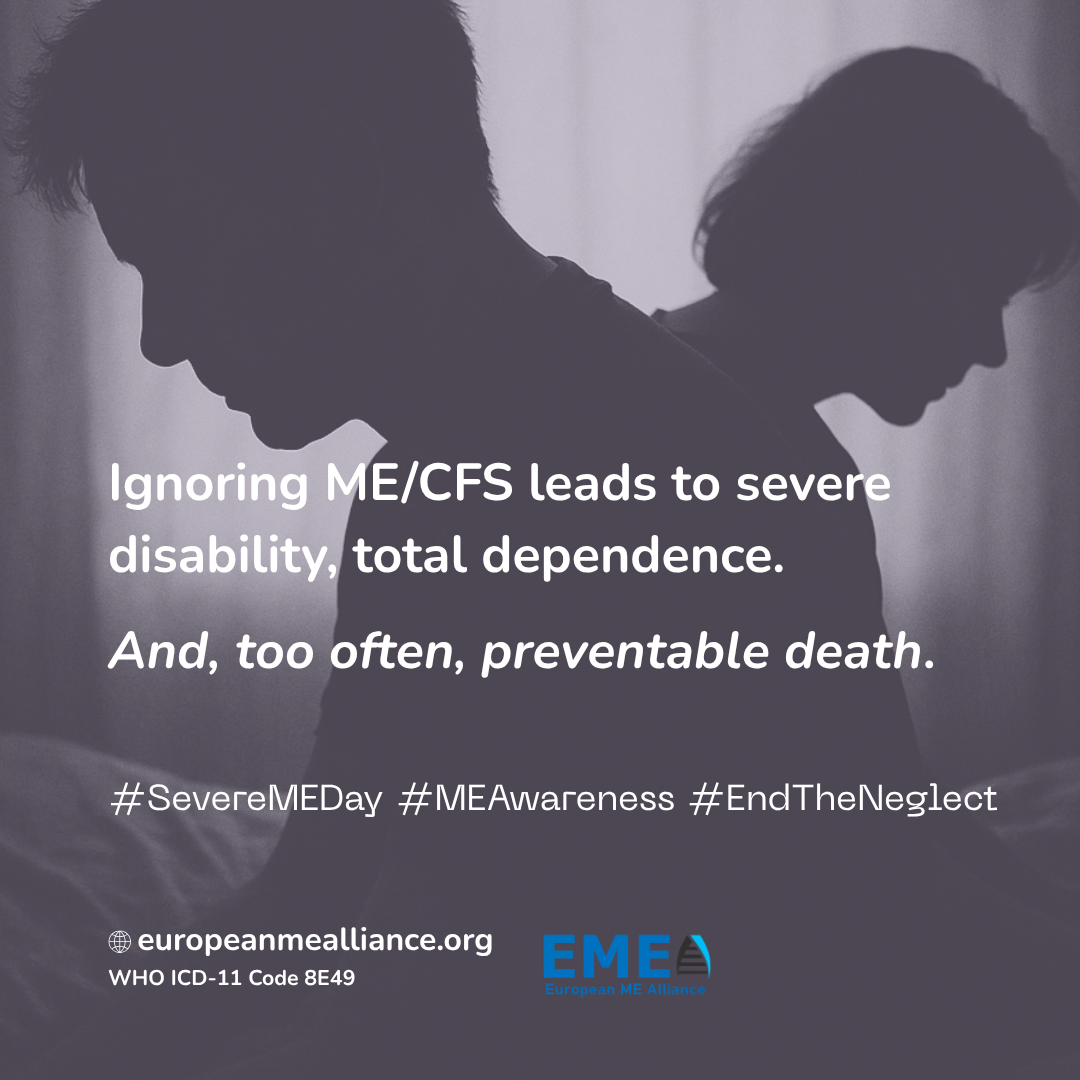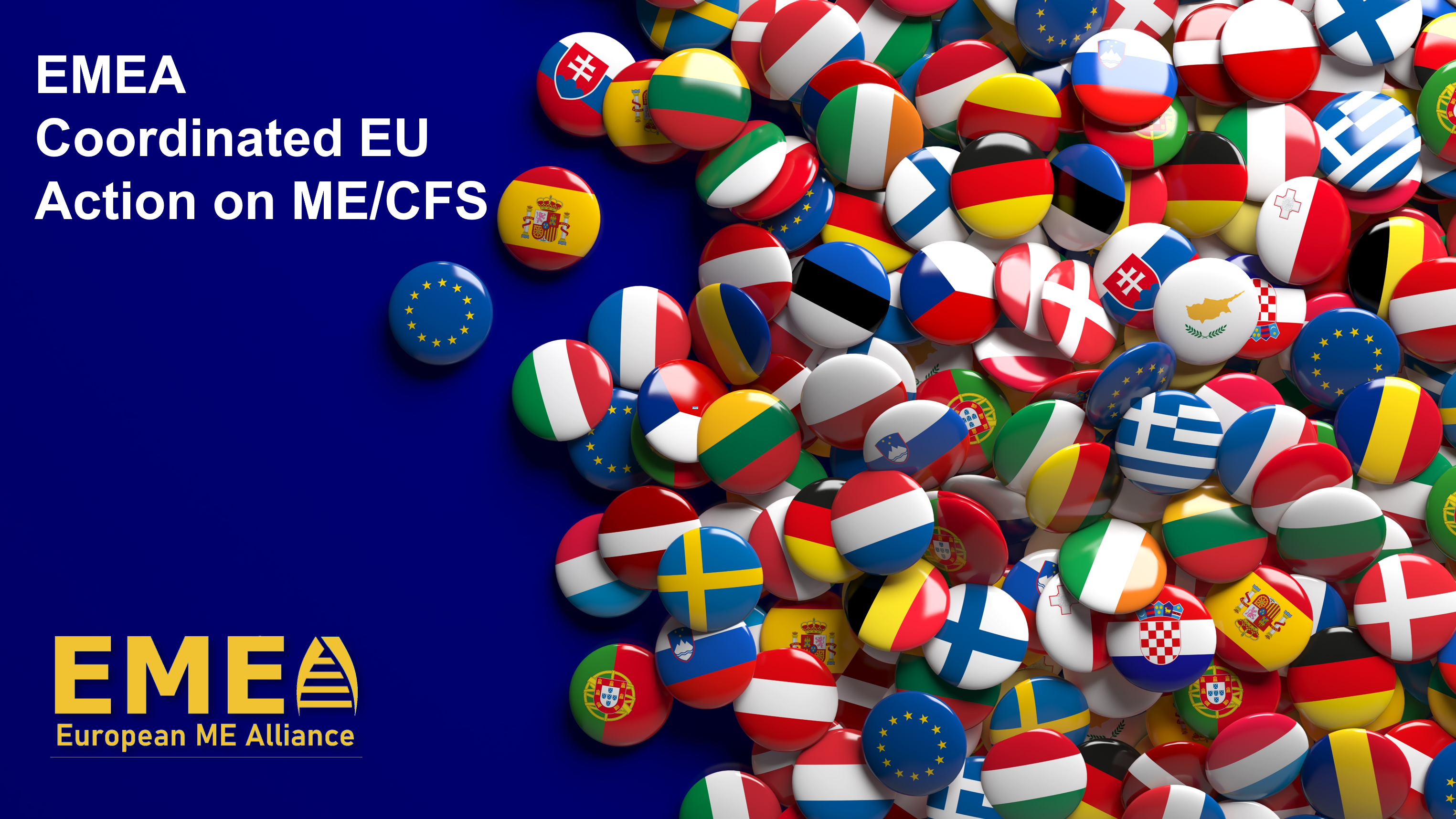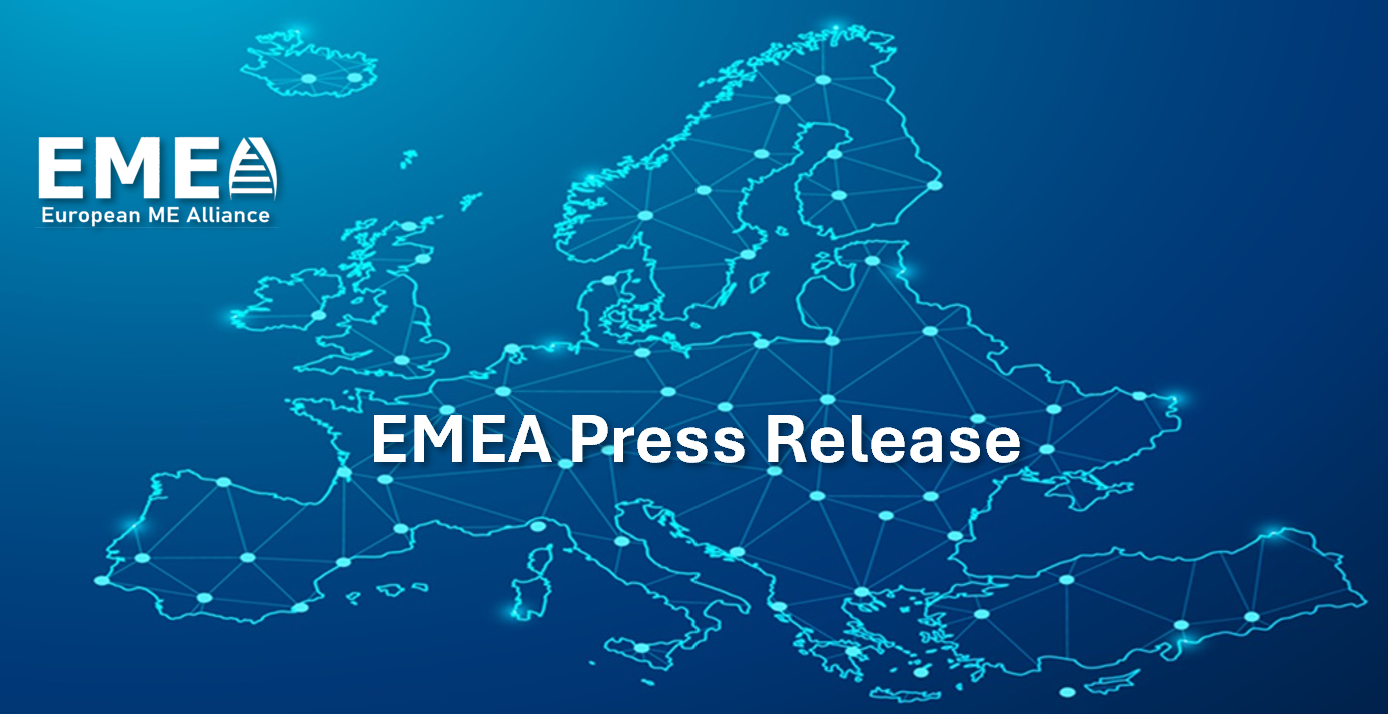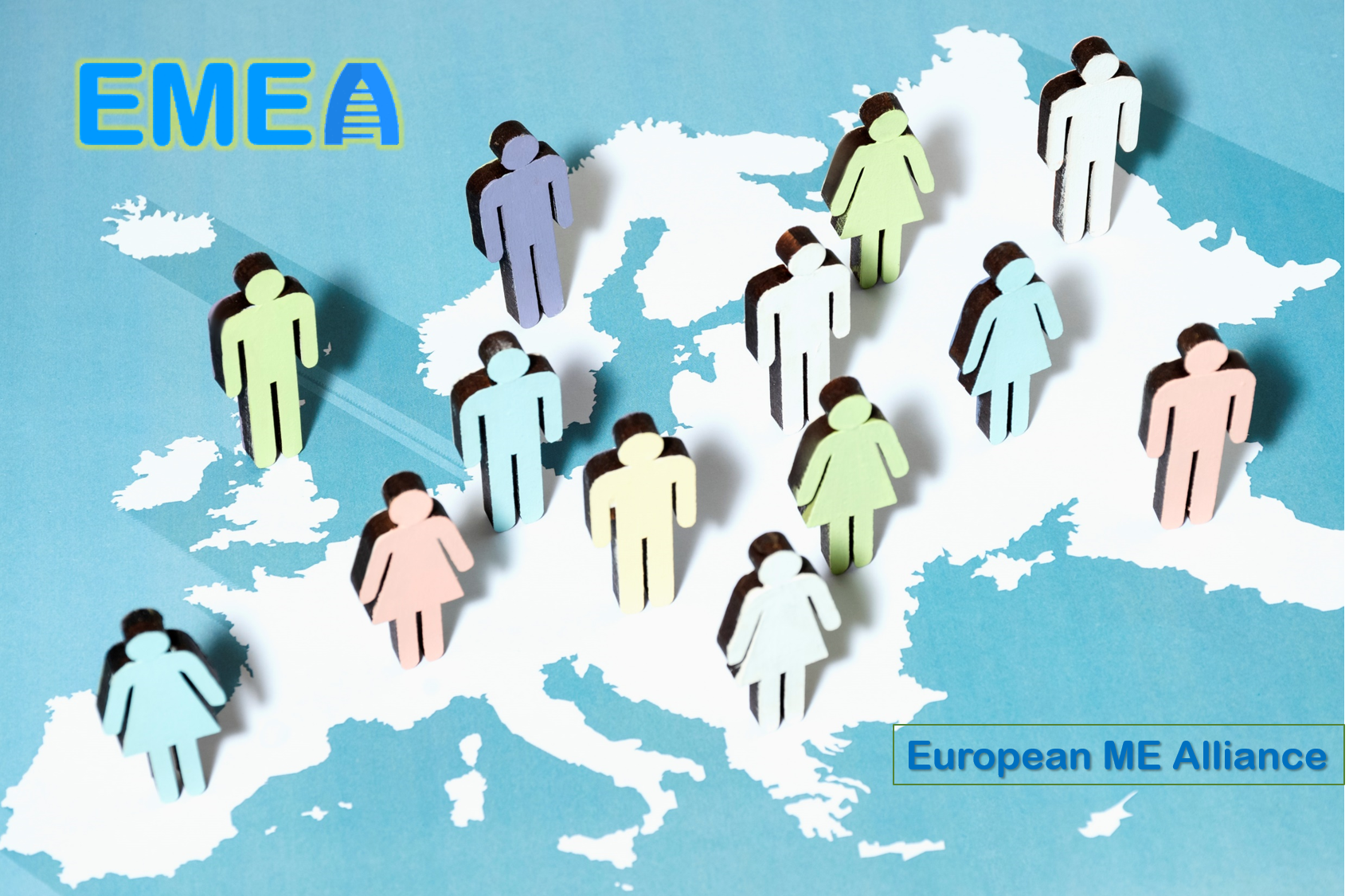Severe ME : A Human and Economic Crisis that Europe Can No Longer Ignore
August 8:
On August 8, we mark Severe ME Day — a day to remember, raise awareness, and urgently call for
action to support people living with severe Myalgic Encephalomyelitis (ME, sometimes referred to as ME/CFS) across Europe.
Around two million Europeans live with ME/CFS, and of those approximately 25% are housebound or bedbound,
often for decades.
These are individuals often hidden away from the public eye — confined to their homes,
sometimes to their beds, and in the most severe cases, even reliant on tube feeding. Their voices rarely reach
beyond those walls.
Their suffering? So often ignored. The consequences are heartbreaking: crushing isolation,
medical neglect, and far too many preventable deaths by suicide.
But this is not just a human rights issue — it is a growing economic and public health disaster. ME steals education, careers, and independence. Patients endure unimaginable suffering. Families face personal and financial hardship. Healthcare systems miss chances for early intervention, which can improve patient outcomes. And society as a whole loses valuable contributions and talent.
What is Severe ME Day?
Severe ME Day shines a light on the most debilitating form of ME/CFS. It honours those who have died with, or as a result of, severe ME.
It is also a day to push for better medical care, improved support services, and adequate research funding. A day also to recognise the bravery and dignity of individuals such as Anne Örtegren, whose selflessness and integrity, even in suffering, made visible the harsh reality of severe ME and the desperate need for action.
Learn more about Anne Örtegren’s story and farewell message here.
The Cost of Doing Nothing — and Why Evidence-Based Care Matters
Turning a blind eye to ME does not save money. It costs lives — and it drains public resources. Without early diagnosis and the correct support, ME can spiral into severe, lifelong disability. When that happens, recovery becomes less likely, and care costs soar.
In the UK, the annual economic burden of ME has been estimated to exceed £3.3 billion.
Across Europe, the true cost is anyone’s guess — simply because most
countries have not even tried to ascertain this.
Lost productivity.
Unpaid family caregivers stretched to their limits.
Welfare systems under strain.
Research funding slipping away.
All this, while patients lie alone in dark rooms, hoping that someone, somewhere will eventually see them.
Our EMEA Pan-European ME Patient Survey 2024 presents the evidence clearly and unequivocally:
- 75% of ME patients say they have little or no access to healthcare
- One in four patients are housebound or bedbound.
- It takes nearly seven years on average to get a diagnosis.
- Treatments such as Graded Exercise Therapy (GET) and Cognitive Behavioural Therapy (CBT) — still promoted in some places — actually make many patients worse.
- Patients diagnosed early and taught energy management skills such as pacing fare much better in the long run.
“Successful pacing also requires that the patient knows what pacing is,
and — critically — has sufficient help and support from the
environment to make pacing possible.”
— EMEA Pan-European Survey, 2024
Without that help, too many face total dependence — or even death.
The Path Forward: Early Action Makes All the Difference
The heartbreaking truth is that many of the most severe outcomes could have been prevented.
Early diagnosis and support can help stop ME from becoming severe.
Patients who learn to pace themselves — carefully managing energy to avoid the devastating crashes known
as post-exertional malaise (PEM) —
stand a better chance of stabilising.
But pacing only works when it is understood and supported by healthcare
and social services.
Too often, patients are dismissed, misdiagnosed, or told their illness is “all in their head.” That disbelief only makes things worse — and the costs, both human and financial, continue to climb.
At the EMEA-UK member Invest in ME Research's International ME Conference (#IIMEC17),
Professor Ola Didrik Saugstad
presented hopeful results from
treatment programs tailored specifically for severely affected ME patients.
His evidence-based approach
offers real, practical hope for
healthcare providers.
One can see Professor Saugstad’s presentation - A Review of Experiences of Treatment Protocols for Severely Affected People with ME - at this address.
ME/CFS Deserves an EU Response
ME/CFS is a disabling, multisystem disease affecting 2 million+ people in Europe. Despite its impact, it remains largely invisible in EU data, policy, and funding.
It would be easy just to call for this action or that action, knowing full well that nothing will be done.
This happens all of the time.
However, we believe that change can occur.
The EU can take realistic action - without creating new institutions or overstepping its competences.
What We Propose the EU Should Do
1. Commission an EU Impact Assessment on ME/CFS
- Via DG SANTE or the Joint Research Centre
- Identify prevalence, economic burden, care gaps
- Justified by the absence of harmonised data (e.g. underuse of SNOMED CT & ICD-11)
2. Include ME/CFS in EU Disability Strategy Implementation
- Reference ME/CFS in guidance to Member States and ESF+ funding calls
- Ensure people with invisible disabilities are not excluded from support
3. Coordinate Biomedical Research Using Existing Structures
- Build on the European ME Research Group (EMERG) and support European Centres of Excellence for Fundamental Research into ME
- Fund via a COST Action, Joint Action (EU4Health), or CSA (Horizon Europe)
- Avoid fragmentation by strengthening what already exists
4. Fund Open-Access ME/CFS Training via EU Programmes
- Use Erasmus+, EU4Health, or EU Academy
- Respect national curriculum control while providing shared, evidence-based materials
What We Are Not Asking From the EU
We are not asking the EU to:
- Mandate clinical practice
- Interfere in national curricula
- Create new institutions
We are asking the EU to:
- Use proven EU mechanisms
- Fund and formalise existing efforts
- Treat ME/CFS as a legitimate public health challenge
![]() Read the one page summary for the EMEA Proposals here
Read the one page summary for the EMEA Proposals here
![]() Read the full document (4 pages) for the EMEA Proposals here
Read the full document (4 pages) for the EMEA Proposals here
Who We Are
The European ME Alliance (EMEA) is a network of national patient organisations and charities united in its objective: to improve the lives of people with ME across Europe.
We advocate for:
- Human rights for all patients — especially those most severely ill
- Evidence-based care grounded in science
- Ending stigma, delays, and harmful treatments
- Funding biomedical research needed for real progress
- Making sure no patient is left behind — no matter how invisible
We initiated and support European networks for researchers and clinicians (European ME Research Group) and for young/early career researchers (Young EMERG) to kickstart collaborative European research in the absence of official support.
In addition, we have partnered with the European Federation of Neurological Associations (EFNA), the European Disability Forum (EDF), and the European Patients’ Forum (EPF).
EMEA holds non-state actor status with the World Health Organization Regional Office for Europe, allowing it to participate officially in WHO regional meetings and advocate for ME at the European public health level.
Together, we are working to ensure ME gets the recognition and resources it desperately needs across the EU.
Join Us: End the Silence Around Severe ME
We must represent those who cannot speak for themselves — and provide a direction and a voice for those still fighting to survive.
Your voice can make a difference. Share this message, raise awareness, and contact your representatives today. We need, together, to pull ME out of the shadows — and into the light of policy, care, and dignity.
Make contact with your healthcare or political representative or Member of the MEP Interest Group on Brain Health and Neurological Conditions
We understand how difficult this situation is for so many.
Severe ME is an invisible crisis and too many suffer it alone.
Patients, families, advocates, healthcare decision-makers, policymakers, the media —
we can change the story.
Every action counts. Every voice matters. And every step forward brings hope closer.
